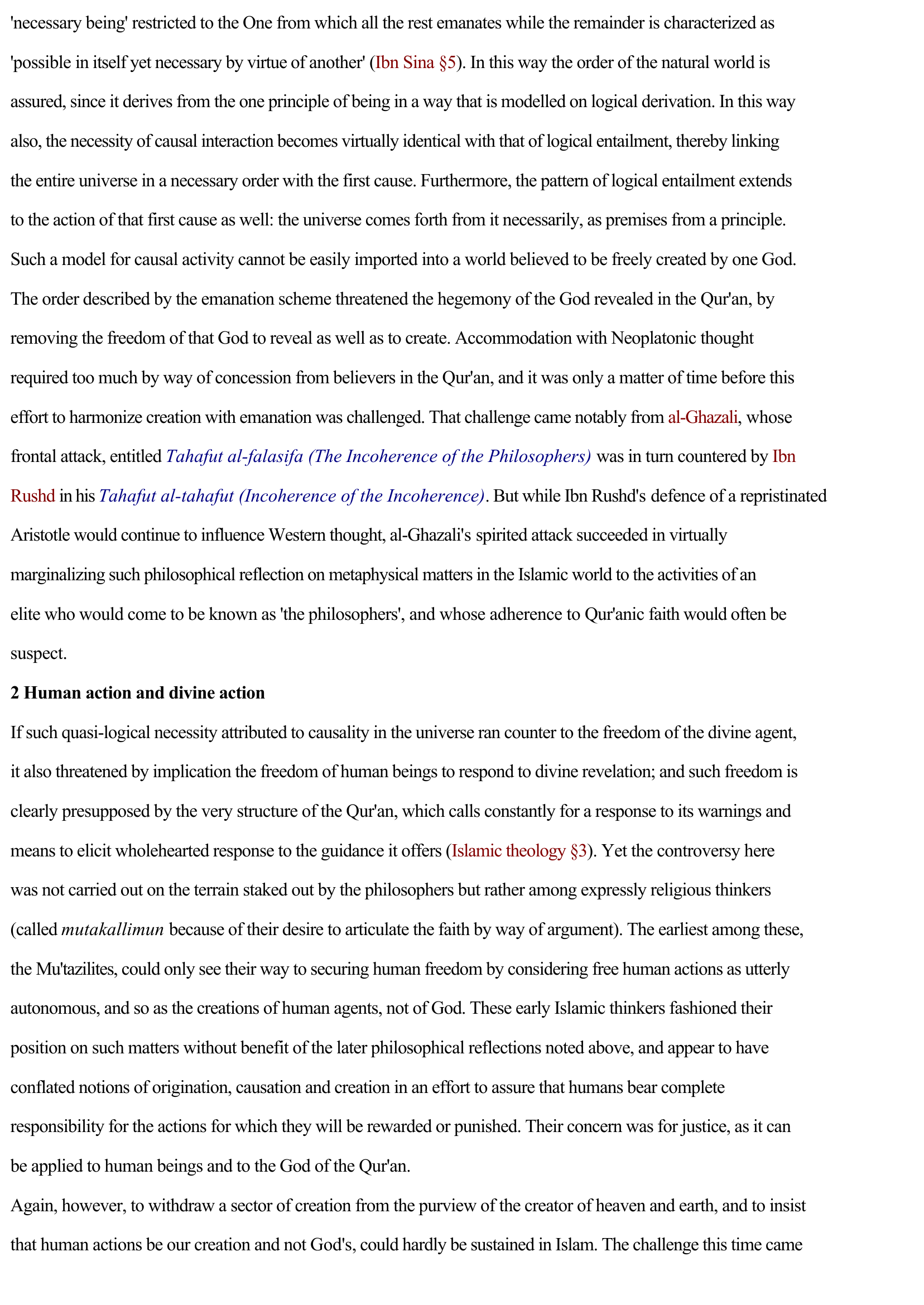Causality and necessity in Islamic thought
Publié le 22/02/2012
Extrait du document
«
'necessary being' restricted to the One from which all the rest emanates while the remainder is characterized as
'possible in itself yet necessary by virtue of another' (Ibn Sina §5 ).
In this way the order of the natural world is
assured, since it derives from the one principle of being in a way that is modelled on logical derivation.
In this way
also, the necessity of causal interaction becomes virtually identical with that of logical entailment, thereby linking
the entire universe in a necessary order with the first cause.
Furthermore, the pattern of logical entailment extends
to the action of that first cause as well: the universe comes forth from it necessarily, as premises from a principle.
Such a model for causal activity cannot be easily imported into a world believed to be freely created by one God.
The order described by the emanation scheme threatened the hegemony of the God revealed in the Qur'an , by
removing the freedom of that God to reveal as well as to create.
Accommodation with Neoplatonic thought
required too much by way of concession from believers in the Qur'an , and it was only a matter of time before this
effort to harmonize creation with emanation was challenged.
That challenge came notably from al-Ghazali , whose
frontal attack, entitled Tahafut al-falasifa (The Incoherence of the Philosophers) was in turn countered by Ibn
Rushd in his Tahafut al-tahafut (Incoherence of the Incoherence) .
But while Ibn Rushd 's defence of a repristinated
Aristotle would continue to influence Western thought, al-Ghazali 's spirited attack succeeded in virtually
marginalizing such philosophical reflection on metaphysical matters in the Islamic world to the activities of an
elite who would come to be known as 'the philosophers' , and whose adherence to Qur'anic faith would often be
suspect.
2 Human action and divine action
If such quasi-logical necessity attributed to causality in the universe ran counter to the freedom of the divine agent,
it also threatened by implication the freedom of human beings to respond to divine revelation; and such freedom is
clearly presupposed by the very structure of the Qur'an , which calls constantly for a response to its warnings and
means to elicit wholehearted response to the guidance it offers ( Islamic theology §3 ).
Yet the controversy here
was not carried out on the terrain staked out by the philosophers but rather among expressly religious thinkers
(called mutakallimun because of their desire to articulate the faith by way of argument).
The earliest among these,
the Mu'tazilites , could only see their way to securing human freedom by considering free human actions as utterly
autonomous, and so as the creations of human agents, not of God.
These early Islamic thinkers fashioned their
position on such matters without benefit of the later philosophical reflections noted above, and appear to have
conflated notions of origination, causation and creation in an effort to assure that humans bear complete
responsibility for the actions for which they will be rewarded or punished.
Their concern was for justice, as it can
be applied to human beings and to the God of the Qur'an .
Again, however, to withdraw a sector of creation from the purview of the creator of heaven and earth, and to insist
that human actions be our creation and not God's , could hardly be sustained in Islam.
The challenge this time came.
»
↓↓↓ APERÇU DU DOCUMENT ↓↓↓
Liens utiles
- Islamic Art and Architecture I INTRODUCTION Córdoba Mosque Courtyard This mosque and courtyard with its repeated horseshoe arches was built between the 8th and 10th centuries in Córdoba, Spain.
- Karl Marx I INTRODUCTION Karl Marx (1818-1883), German political philosopher and revolutionary, the most important of all socialist thinkers and the creator of a system of thought called Marxism.
- Animal language and thought
- KUHN, Thomas. The Nature and Necessity of Scientific Revolutions
- Ideology and Rationality in the History of the Life Sciences

































